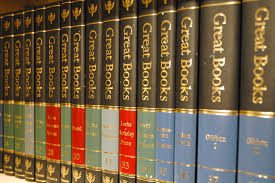What are Great Books and Art?
Glossary
of Terms
Great Books & Art:
Great books and art have stood the test of time and, over time, communicate truth, goodness, and beauty in a substantial way. Most include ideas that have influenced and shaped history and the development of Western civilization, and have added meaningfully to the Great Conversation. In this way, they are important pieces of cultural heritage.
 We’ve all heard of the classics: Homer, Augustine, Dante, Shakespeare, Dostoyevsky, with the list still expanding. There’s a reason we’ve heard of them. In the 1950s, Mortimer Adler assembled a collection of classics based on the Western tradition which he called the “Great Books.” The term “Western Canon” includes much of the same corpus, but it highlights Western works, whereas great books are not necessarily so.
We’ve all heard of the classics: Homer, Augustine, Dante, Shakespeare, Dostoyevsky, with the list still expanding. There’s a reason we’ve heard of them. In the 1950s, Mortimer Adler assembled a collection of classics based on the Western tradition which he called the “Great Books.” The term “Western Canon” includes much of the same corpus, but it highlights Western works, whereas great books are not necessarily so.
Adler also identified 102 great ideas which can be traced through them. You can read more under Great Ideas, but in summary, the great books deal with age-old questions that all of human experience shares in common, such as “time” and “justice.” Through great books, students learn to engage with arguments and assumptions from times very different from their own. And, they develop deeply rooted moral imaginations and perspectives on life, especially through great children’s literature.
When dealing with these classic books, educators must guard against two dangers. The first is considering our subjective interpretations of the book too much and the author’s actual point too little. The second danger is placing ourselves above the book and dissecting it, like a scientist dissects a cat, without learning to enjoy or appreciate the book. We strive to read the books as they were intended to be read: as texts written by authors who have something important to say, and as writing that was meant to be enjoyed.
Every age has its own outlook. It is specially good at seeing certain truths and specially liable to make certain mistakes. We all, therefore, need the books that will correct the characteristic mistakes of our own period.
Why Read the Classics?
 C.S. Lewis made one of the strongest arguments for reading old words. They allow us to step out of the assumptions of our time and place, and to live and experience another. We don’t do this because the people back then had no problems, but rather because they had different problems than we do, or confronted them in different ways. When we step out of our usual ways of thinking, we see the world through different lenses. And when we have seen with different lenses, we are better equipped to see problems in our own time, to understand the past, and to learn from our predecessors.
C.S. Lewis made one of the strongest arguments for reading old words. They allow us to step out of the assumptions of our time and place, and to live and experience another. We don’t do this because the people back then had no problems, but rather because they had different problems than we do, or confronted them in different ways. When we step out of our usual ways of thinking, we see the world through different lenses. And when we have seen with different lenses, we are better equipped to see problems in our own time, to understand the past, and to learn from our predecessors.It is a good rule after reading a new book, never to allow yourself another new one till you have read an old one in between.
